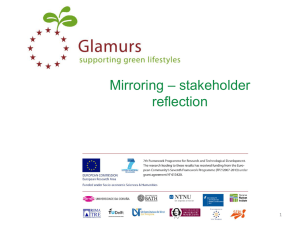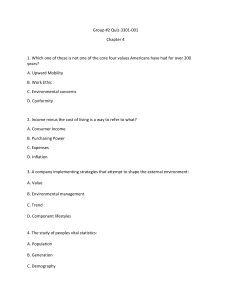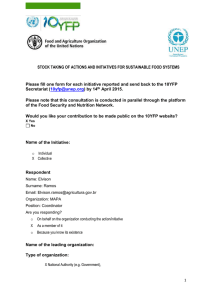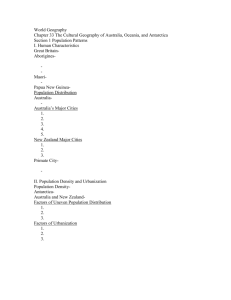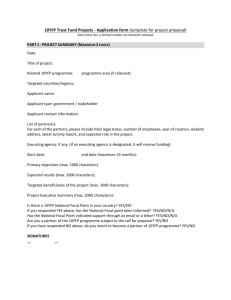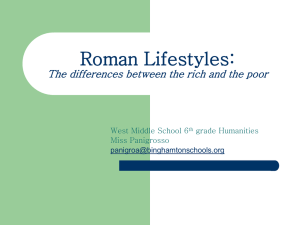10YFP Sustainable Lifestyles and Education Programme Trust Fund
advertisement
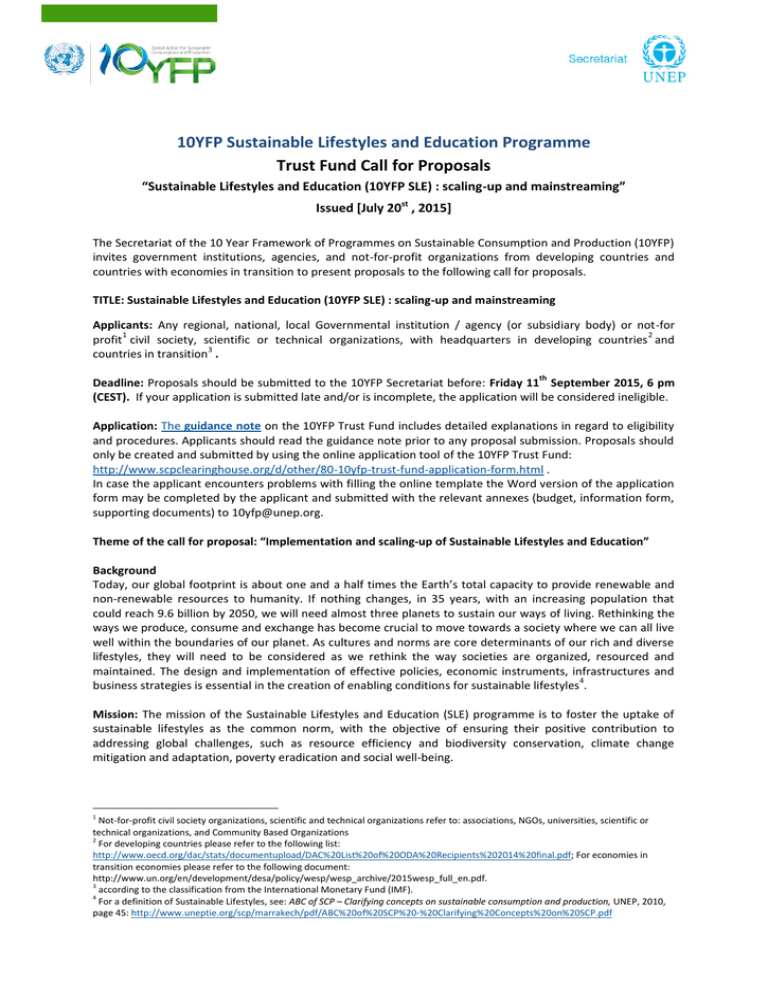
10YFP Sustainable Lifestyles and Education Programme Trust Fund Call for Proposals “Sustainable Lifestyles and Education (10YFP SLE) : scaling-up and mainstreaming” Issued [July 20st , 2015] The Secretariat of the 10 Year Framework of Programmes on Sustainable Consumption and Production (10YFP) invites government institutions, agencies, and not-for-profit organizations from developing countries and countries with economies in transition to present proposals to the following call for proposals. TITLE: Sustainable Lifestyles and Education (10YFP SLE) : scaling-up and mainstreaming Applicants: Any regional, national, local Governmental institution / agency (or subsidiary body) or not-for 1 2 profit civil society, scientific or technical organizations, with headquarters in developing countries and 3 countries in transition . th Deadline: Proposals should be submitted to the 10YFP Secretariat before: Friday 11 September 2015, 6 pm (CEST). If your application is submitted late and/or is incomplete, the application will be considered ineligible. Application: The guidance note on the 10YFP Trust Fund includes detailed explanations in regard to eligibility and procedures. Applicants should read the guidance note prior to any proposal submission. Proposals should only be created and submitted by using the online application tool of the 10YFP Trust Fund: http://www.scpclearinghouse.org/d/other/80-10yfp-trust-fund-application-form.html . In case the applicant encounters problems with filling the online template the Word version of the application form may be completed by the applicant and submitted with the relevant annexes (budget, information form, supporting documents) to 10yfp@unep.org. Theme of the call for proposal: “Implementation and scaling-up of Sustainable Lifestyles and Education” Background Today, our global footprint is about one and a half times the Earth’s total capacity to provide renewable and non-renewable resources to humanity. If nothing changes, in 35 years, with an increasing population that could reach 9.6 billion by 2050, we will need almost three planets to sustain our ways of living. Rethinking the ways we produce, consume and exchange has become crucial to move towards a society where we can all live well within the boundaries of our planet. As cultures and norms are core determinants of our rich and diverse lifestyles, they will need to be considered as we rethink the way societies are organized, resourced and maintained. The design and implementation of effective policies, economic instruments, infrastructures and 4 business strategies is essential in the creation of enabling conditions for sustainable lifestyles . Mission: The mission of the Sustainable Lifestyles and Education (SLE) programme is to foster the uptake of sustainable lifestyles as the common norm, with the objective of ensuring their positive contribution to addressing global challenges, such as resource efficiency and biodiversity conservation, climate change mitigation and adaptation, poverty eradication and social well-being. 1 Not-for-profit civil society organizations, scientific and technical organizations refer to: associations, NGOs, universities, scientific or technical organizations, and Community Based Organizations 2 For developing countries please refer to the following list: http://www.oecd.org/dac/stats/documentupload/DAC%20List%20of%20ODA%20Recipients%202014%20final.pdf; For economies in transition economies please refer to the following document: http://www.un.org/en/development/desa/policy/wesp/wesp_archive/2015wesp_full_en.pdf. 3 according to the classification from the International Monetary Fund (IMF). 4 For a definition of Sustainable Lifestyles, see: ABC of SCP – Clarifying concepts on sustainable consumption and production, UNEP, 2010, page 45: http://www.uneptie.org/scp/marrakech/pdf/ABC%20of%20SCP%20-%20Clarifying%20Concepts%20on%20SCP.pdf 5 Objectives of the 10YFP-SLE Programme are as follows : Build a shared vision of sustainable lifestyles; Integrate sustainable lifestyles principles and practices across all sectors of society; Develop tools and incentives, provide capacity-building for achieving sustainable lifestyles and disseminating good practices; Empower individuals to adopt sustainable lifestyles through education, awareness-raising and participation, engaging all forms of education; Measure and track the benefits of action targeting sustainable lifestyles. The programme consists of three main work areas of the 10YFP-SLE Programme: 1. Developing and Replicating Sustainable Lifestyles, including Low Carbon Lifestyles 2. Educating for Sustainable Lifestyles 3. Transforming Current and Shaping Future Generation´s Lifestyles. Selected projects must contribute substantially to one (or more) of the following 17 sub-work areas that have been prioritized by the SLE programme for the first two years (see table below): Work Area Work Area 1: Developing and Replicating Sustainable Lifestyles, including Low Carbon Lifestyles (6 sub-work areas) Priority area for the first two years of the 10YFP SLE programme • Identify innovative models and traditional practices (1a.1) • Support the implementation of pilot projects to replicate and/or scale-up (1a.3) • Disseminate and increase the visibility of best practices (1a.5); • Showcase examples of policies, infrastructure development and instruments (1b.3); • Organize dialogues with the private sector, consumers and policy makers (1b.4); • Identify best business practices and promising innovations (1c.1); Work Area 2: Educating for Sustainable Lifestyles (7 sub-work areas) Promote Sustainable Lifestyles as an objective of education policies at national level and its inclusion into formal education curricula at all levels (2a.1); Support multi-disciplinary research and cooperation in the development of ESCL toolkits and learning / teaching materials (2a.2); Develop initiatives and work with education institutions, including higher education institutions (2a.3); Develop, promote, adapt and disseminate guidelines for public campaigns on SL and share good practices (2b.1); Showcase, mainstream and upscalegood practices for SL in workplaces, including internship and/or scholarship programmes that encourage youth to develop innovative solutions on SL (2b.2); Research and disseminate best practices that facilitate the adoption of sustainable behaviours in home environments (2b.3); Support youth networks and engage policy makers in building and maintaining an interactive dialogue with youth and youth organizations on SLE (2c.1). Work Area 3: Transforming current and shaping future generations’ lifestyles (4 sub-work-areas) Promote a multi-disciplinary research and pragmatic approach to SL (3a.1); Develop tools to operationalize the assessment of lifestyles (3b.2); Develop methodologies and systems for households and consumers to measure their lifestyle impacts (3b.3); Support the programme’s activities in defining objectives to address global challenges (3c.1). A more detailed description of the programme’s objectives and each of the work areas and sub-work areas is 6 provided in the 10YFP-SLE Programme document, available on the 10YFP-SLE website . 5 http://www.unep.org/10yfp/Programmes/ProgrammeConsultationandCurrentStatus/Sustainablelifestylesandeducation/t abid/106266/language/en-US/Default.aspx 6 http://www.unep.org/10yfp/Portals/50150/10YFP%20SPP/Programmes%20template/SLE%20template.pdf Objectives of this call for proposal: The primary objective pursued in this call for proposal is to “identify innovative ideas that help accelerate the transition toward sustainable and low carbon lifestyles by scaling up existing approaches and mainstreaming sustainable lifestyles”. Expected results: It is important that applicants clearly outline which tangible results / outcomes the proposed 7 action seeks to contribute to, such as reduction of material use, decreasing pollution, etc . In addition, project proposals must clearly outline how project implementation will result in or contribute to reduced CO2/greenhouse gas emissions. Proposals must also include a clear description of how the expected results will be measured in the course of the project. Proposals are encouraged to use Sustainable Production and Consumption indicators that can 8 help demonstrate measureable results, such as, those identified in the guidance provided by UNEP and/or other recognized agencies, as appropriate. Types of projects supported through the call: Implementation of projects to replicate and/or scale-up promising practices (innovative and/or traditional practices) and solutions for sustainable and low carbon lifestyles, based on bottom-up and participatory approaches, and tracking and measuring associated benefits; Implementation of projects, especially at the local or community level, aiming at triggering or enabling policy, business strategies and behavioral change with high impact potential (mobility, food, housing, ITCs, waste management, tourism); Scaling up of existing, high-impact initiatives driven by education institutions, including higher education institutions, and teachers for the mainstreaming of Sustainable Lifestyles principles into their daily management as well as in their programmes, with the active participation of students. Appliicants are also encouraged to demonstrate the links to the commitmens and activities under the 9 UNESCO GAP ; Supporting the scaling up of youth networks and engaging policy makers in building and maintaining an interactive dialogue with youth and youth organizations on Sustainable Lifestyles and Education; Encourage the dissemination and active engagement, at scale, of youth in developing solutions and visions for Sustainable Lifestyles through outreach tools and activities. Specific requirements: Beyond requirements relevant to all 10YFP Trust Fund calls for proposals (available in the guidance document), requirements for this call are: 1. Project duration should be between 12 and 24 months.When developing the full proposal, applicants will be requested to provide for preliminary results to be reported in time for the mid term evaluation of the 10YFP, which is scheduled to take place in mid-2017 2. Project amount should range between 100,000 USD and 200,000 USD. 3. Project is integrated in and coherent with the Country's sustainable development, Sustainable Consumption and Production (SCP) or Green Economy strategy - when they exist. 4. Project implementation will result in or contribute to reduced CO2/greenhouse gas emissions, and the methodology for providing scientific estimations of real or potential CO2/greenhouse gas emissions reductions or prevention must be presented in the project proposal; 5. Projects which may ultimately involve Sustainable Lifestyles and Education policy or legal changes, should be endorsed by a relevant national authority (such as Ministry of Finance, Planning or Economy, Ministry of Education, and/or Ministry of Environment). Projects that are primarily focused on education are encouraged to demonstrate alignment with the UNESCO Global Programme for Action on Education for 10 Sustainable Development (ESD-GAP) . 7 Projects should give specific emphasis to the human behaviour angle of adopting sustainable lifestyles (rather than technical cleaner production projects for SMEs) 8 UNEP publication “Sustainable Consumption and Production Indicators”, UNEP discussion paper – March 2015 https://www.iisd.org/sites/default/files/publications/sustainable-consumption-production-indicators-future-sdgs_0.pdf 9 http://www.unesco.org/new/en/unesco-world-conference-on-esd-2014/esd-after-2014/global-action-programme/ 10 http://www.unesco.org/new/en/unesco-world-conference-on-esd-2014/esd-after-2014/global-action-programme/ 6. Projects that involve significant private-sector involvement should demonstrate alignment with companies’ business strategies by formal letters of support from private sector players that are willing to commit to supporting the implementation of SCP. 7. The applicant (and, as far as possible, also contributing project partners) should be or should commit to formally join the 10YFP Programme on Sustainable Lifestyles and Education programme as an 11 implementation partner . 8. Projects should demonstrate that they have clear replication potential by providing (a) a solid analysis of barriers for scaling up (i.e., why the selected approaches have so far failed to deliver at scale) and (b) provide a clear pathways for scaling up (ie., a solid description and analysis why and how they can be scaled up: e.g. business cases for adoption). They should also seek to quantify, as far as possible, the replication potential by measurable indicators, including CO2/greenhouse gas emissions. 9. Projects should lead to the transfer and creation of national capacities in the field of Sustainable Lifestyles and Education. 10. The sustainability of the project activities should be ensured, once the funded project duration is over. These requirements, together with the criteria available in the annex 2 of the guidance document, will be used in the assessment of proposals. All project submitted project proposals will be strictly assessed according to these criteria, based on the information and conclusions presented in each proposal. For project proposals that receive the highest score in the selection process, the applicant will then be required to develop a full project document. Evidence/endorsement from relevant government authorities and private sector partners: Evidence of consultation of the National Focal Point (if he/she has been nominated) on the project proposal must be provided when the applicant type is “Government”. A project proposal submitted by a not-for-profit organization, shall be submitted directly to the 10YFP Secretariat, with a mandatory copy to the 10YFP National Focal Point of their country. It is highly encouraged for Applicants to provide endorsement letters and/or support letters from the relevant government authorities as well as from private sector partners. Indicative timetable after the deadline: Publication of the call for proposals Deadline for submission of proposals Evaluation period Information to successful and usuccessful applicants Full Project Document developed/submitted Signature of grant agreement Starting date of the project Project reports on preliminary results 12 Projects completed th July 20 , 2015 th September 11 , 2015 September-October 2015 Early November 2015 Early January 2016 February 2016 February 2016 End of January 2017 End 2017 – Mid 2018 Budget Available: The total budget available for this call is USD 500,000. The 10YFP reserves the right not to distribute all the funds available. Thank you for your interest! Should you have any queries regarding the call for proposals please contact the 10YFP Secretariat at: 10YFP@unep.org 11 Instructions how to become a partner of the 10YFP are available from the 10YFP website at the following address: http://www.scpclearinghouse.org/upload/file_management/file/112.pdf. The Applicant will only be allowed to sign the grant agreement after confirmation of his partner status. 12 Projects should deliver concrete results in time for mid-term review of the 10YFP to be conducted in 2017.
